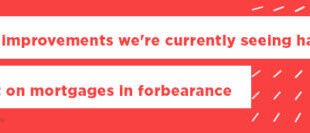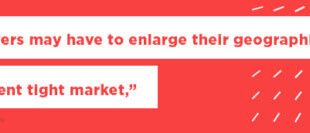6 minute read
The two most popular types of mortgage loans used today are Conventional and FHA loans.
Choosing the right mortgage program is critical to make sure you get the best deal on your loan.
In this article we compare FHA and Conventional loans so you can discover which one if best for your situation.
SEARCH RATES: Check Today’s Mortgage Rates
FHA vs Conventional Loan Comparison Chart Infographic
Pros and Cons of Conventional Mortgages
Pros
Cons
- 620 credit score requirement (higher than FHA)
- Large downpayment 5%-20%
- More difficult to qualify for than FHA
Pros and Cons of FHA Mortgages
Pros
- Low downpayment requirement of 3.5%
- Easier to get approved for than conventional loans.
- Lower credit scores accepted
- Low mortgage interest rates
Cons
- Lower maximum loan limits
- Mortgage insurance required even if putting 20% down
- Mortgage insurance monthly cost is higher
Minimum Credit Score Requirements

Your credit score is the biggest factor in getting a mortgage, and getting the best rates. It is best to have a 620 credit score for either a conventional or FHA loan.
If you have poor credit and your score is below 620, then an FHA may be a better option.
FHA requires a 500-479 credit score with 10% down. And a 580 or higher score with just a 3.5% down payment.
Because of the flexible credit guidelines FHA loans are the better option for people with poor credit.
Comparing credit score requirements
- FHA Loan: 500-579 credit score (10% down payment)
- FHA Loan: 580+ credit score (3.5% down payment)
- Conventional Loan: 620+ credit score (5% – 20% down payment)
- Conventional 97: 640+ credit score (3% down payment)
Down Payment
FHA
FHA home loans have a major advantage for people who don’t have the money to make a large down payment.
A 3.5% downpayment is needed if you have a minimum credit score of 580. If you have a credit score of less than 580, you may qualify by paying a larger downpayment of 10 percent.
Conventional
A conventional mortgage will have a down payment of 5% – 20% depending on the lender, loan type, and FICO score of the borrower.
However, there is a conventional 97 loan program that requires just a 3% down payment. This is even lower than FHA loans require.
First-Time Homebuyers
While conventional mortgages are the most popular type of home loan used today.
FHA loans are the most popular type of mortgage used by first-time homebuyers. Mainly because of the low credit and down payment requirements.
Also FHA allows you to use gift funds for 100% of the down payment while most conventional loans do not.
There are also down payment assistance programs and first-time buyer grants you can use for FHA.
Conventional mortgages typically do not allow down payment funds to come from anyone else but the borrower.
Mortgage Insurance
FHA – FHA loans require mortgage insurance premium (MIP). With a Government loan it is referred to as a mortgage insurance premium, or MIP. FHA MIP fee varies but it is typically 0.85% of the loan amount. See FHA MIP Chart
Conventional – A conventional mortgage loan will also have mortgage insurance, called private mortgage insurance, or PMI. It’s only required when the borrower has less than a 20% down payment. PMI on conventional mortgages is usually 0.50% of the loan amount.
How Much Can You Borrow
Conventional Loan Limits
The Conventional home loan limit is$ 453,100 in most areas of the U.S. However this limit increases to $ 679,650 in certain high cost areas.
The loan limit increases as the number of units increases.
If you need a loan for more than the conventional loan limit you will need a Jumbo non-conforming loan.
Jumbo loans are available up to 3 million with a 700 score and 15%-20% down.
- 1-unit home: $ 424,100
- 2-unit home: $ 543,000
- The conventional loan limit for a 3-unit home: $ 656,350
- The conventional loan limit for a 4-unit home: $ 815,650
FHA Loan Limits
FHA Loan limits are much lower with the limit in most of the U.S. is $ 271,050.
The FHA loan limit also increases in certain high cost areas of the country.
| Units | Low-Cost area loan limit | High-Cost area loan limit |
|---|---|---|
| 1 Unit | $ 294,515 | $ 679,650 |
| 2 Units | $ 352,950 | $ 814,500 |
| 3 Units | $ 426,625 | $ 984,525 |
| 4 Units | $ 530,150 | $ 1,223,475 |
See how much house you can afford using our calculator
Debt-to-income
Your debt-to-income ratio is a major determining factor in how much you can borrow.
This calculation is the percentage of your monthly income minus monthly obligations.
The FHA is much more lenient on maximum debt-to-income ratios.
Typical max DTI :
- FHA – Maximum DTI 45% (Can be as high as 50% in some cases)
- Conventional – Maximum DTI 43% (hard DTI cap)
Loan Terms
Both FHA and conventional mortgages have more options than just the standard 30-year fixed-rate mortgage. You can get a 15-year fixed rate or adjustable rate mortgage with either type of loan.
Conventional loans will have more options like a 10,15,20,30, and even 40 year fixed rate mortgage options. As well as adjustable rate terms like a 5-1 ARM.
Adjustable rate mortgages have lower rates than fixed-rate loans and a lower monthly payment.
After the initial period of 5 years the interest rate and monthly payment increase on an annual basis.
A Conventional Mortgage with 20% Down is Cheaper
The upfront costs associated with obtaining an FHA-insured mortgage is lower with a conventional loan because of the low down payment.
However, because PMI is lower on conventional loans, PMI cancels once the LTV reaches 78%, and there is no up-front mortgage insurance fee.
While FHA Loans are cheaper in the beginning. Over the life of the loan conventional loans are the cheapest option.
Eligible Properties
FHA
Conventional
- Single-Family home
- Condominiums and town homes
- Homes in need of repairs
- Detached and semi-detached
View Fannie Mae property requirements
Refinance Programs
Both FHA and Conventional home loans allow you to refinance your mortgage to get a lower mortgage payment and better interest rate.
FHA – If you have an FHA loan you may qualify for an FHA streamline refinance. A streamline refinance works the same as traditional refinancing but requires less paperwork. There is no credit check or income verification. These streamline refinances are done quickly and easily helping borrowers get low rates and reduce their payments.
Conventional – If you have a conventional loan you can refinance your loan as well. There is a traditional rate and term refinance option for conventional mortgages. There are no streamline refinancing options with conventional loans
This is where the interest rate will be lowered and the term can be extended or shortened.
There is another option to refinance your conventional mortgage loan. The HARP program allows borrowers with a loan owned by Fannie Mae, or Freddie Mac to refinance their loan regardless of the amount of equity they have.
Conventional Loans may be Cheaper
If you are someone who is planning on using a 20% down payment to avoid PMI. You have no choice but to get conventional financing, because FHA loans will require mortgage insurance regardless how much your down payment is.
If you have a 20% down and are seeking a 80% leant-value mortgage then a conventional mortgage will be cheaper than FHA.
The Bottom Line…
When comparing FHA and conventional mortgages you need to keep in mine there is no right answer as to which is better, FHA or conventional.
Both mortgages have their advantages and disadvantages.
An FHA home loan might be great for one homebuyer, but not the best option for another buyer.
You need to speak to a mortgage expert to go over the pros and cons of each to see which mortgage program is best for you.
RATE SEARCH: Check Rates and Get Pre-Approved
The Lenders Network has the largest network of mortgage lenders that specialize in home loans for borrowers with all types of credit scores. We will match you will the best lender based on your specific situation.





